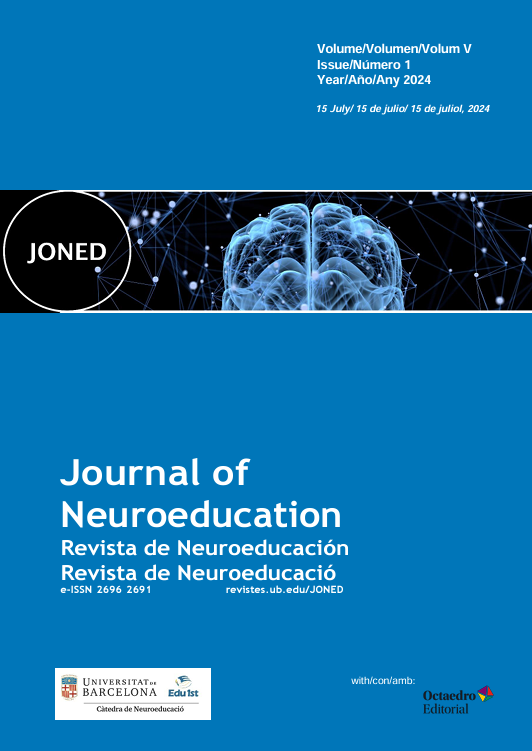Una evaluación de precursores para el inicio escolar a través de una batería digital
Importancia de la evaluación en el nivel inicial como prevención de dificultades de aprendizaje
DOI:
https://doi.org/10.1344/joned.v5i1.46095Keywords:
evaluation, initial level, precursors of learning, linguistic and mathematical skills, predictors, psychopedagogy, NTICAbstract
The latest research in the area of cognitive psychology, neuroeducation and pedagogy recognizes the importance of early intervention and quality education in young children for better later cognitive development. Early evaluation allows us to identify skills and competencies for an adequate start to school. The sighting at precursors of learning helps in prevention, both in educational practice and in clinical work. In this context, a correct evaluation allows: to offer instruction appro-priate to the individual needs of the students, to make decisions based on objective data that can be standardized, and to detect and intervene early on students at risk in basic instrumental learning: reading, writing and calculation. The aim of this work is to present a battery in digital format, Assessment of Competencies for Starting School, CIE Battery (Evaluación de competencias para el inicio escolar, batería CIE) that evaluates basic cognitive competencies for starting school through tests predictive of academic performance. The presentation, evaluation and final processing of data is carried out in digitalized form. It is applicable at the end of the Initial Level or beginning of Primary Level. It is inspired by consolidated theoretical models: the phonological hypothesis, the simple reading model, the Response to Intervention (RTI) model and the latest neuroscience research on the precursors of mathematical and linguistic knowledge. 280 5-year-old children of medium and low socioeconomic level from the metropolitan area of the City of Buenos Aires, Argentina, were evaluated. The results obtained show good reliability and high construct validity of the test. Normative values were configured in quartiles and cut-off points. The results together allow us to maintain that the CIE Battery is a reliable tool for analyzing skills closely linked to school learning. The application of this battery will allow children at risk of presenting learning difficulties to be identified early, in order to intervene as early as possible. The use of New Information and Communication Technologies (NICT) brings reliable and necessary tools to schools.
Downloads
References
Citación: Pujals M., Mendivelzúa A., Ruiz Díaz J., Gasaneo G., Rodriguez K.: Evaluación de Competencias para el Inicio Escolar (Batería CIE)
Downloads
Published
Issue
Section
License
Copyright (c) 2024 Maria Pujals, Alejandra Victorio Mendivelzúa, Juan Ignacio Ruiz Díaz, Gustavo Gasaneo, Karina Viviana Rodríguez

This work is licensed under a Creative Commons Attribution-NonCommercial 4.0 International License.
The authors who publish in this journal agree to the following terms:
a. Authors retain copyright and grant the journal the right of first publication
b. Texts will be published under a Creative Commons Attribution Non Commercial License that allows others to share the work, provided they include an acknowledgement of the work’s authorship, its initial publication in this journal and the terms of the license, and not for commercial use.



